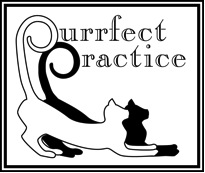England
David Thayer Ice Cream
My friend, Lisa Salvaggio, recently went to England with her older daughter, Taylor. They spotted the David Thayer Ice Cream shoppe in Bath while on a side trip there. Lisa had to send me a photo of the shoppe.
Bob and I had spotted this shoppe on a long ago earlier visit we took to Bath. David Thayer is the name of our older son so quite the coincidence for us. The ice cream shoppe is still in business which is lovely to see.
A look at David Thayer's Ice Cream.


Bob and I had spotted this shoppe on a long ago earlier visit we took to Bath. David Thayer is the name of our older son so quite the coincidence for us. The ice cream shoppe is still in business which is lovely to see.
A look at David Thayer's Ice Cream.


Comments
Greenwich England and Time
27/07/24 09:32 Filed in: History
How did Greenwich England just alongside London become the center of time for the world? We did visit in one of our trips to London the Royal Observatory and learned about this history and the discovery of longitude which was important for ships traveling the global seas.
See more in this article.
See more in this article.
Victoria and Albert
25/01/17 17:17 Filed in: History
The Masterpiece TV series on Queen Victoria is going on currently. This link shows the progeny and grandchildren of Victoria.
"Albert's nine children and 26 of their 34 grandchildren, who survived childhood, married into royal and noble families across the continent, tying them together and earning her the nickname "the grandmother of Europe".
Victoria's reign of 63 years and 7 months, which is longer than that of any other British monarch and the longest of any female monarch in history, is known as the Victorian era. It was a period of industrial, cultural, political, scientific, and military change within the United Kingdom, and was marked by a great expansion of the British Empire. She was the last British monarch of the House of Hanover; her son and successor Edward VII belonged to the House of Saxe-Coburg and Gotha."
"Albert's nine children and 26 of their 34 grandchildren, who survived childhood, married into royal and noble families across the continent, tying them together and earning her the nickname "the grandmother of Europe".
Victoria's reign of 63 years and 7 months, which is longer than that of any other British monarch and the longest of any female monarch in history, is known as the Victorian era. It was a period of industrial, cultural, political, scientific, and military change within the United Kingdom, and was marked by a great expansion of the British Empire. She was the last British monarch of the House of Hanover; her son and successor Edward VII belonged to the House of Saxe-Coburg and Gotha."
Elizabeth I Clothing Found
10/01/17 12:06 Filed in: History
A skirt of Elizabeth I, Queen of England, has been found as being part of an altar skirt in a church in England. The is the only piece of clothing of hers that seems to remain from that time. When we were going through the Tower Of London's museum on a tour, we were told that much of the monarchy's belongings were lost, destroyed or given away during Cromwell's time. Such may be the case here.
Read about this find here.
Read about this find here.
Shell Grotto in Margate
28/07/16 08:42 Filed in: Interests
Best Breakfasts in Britain
14/07/16 08:04 Filed in: Interests
I am not sure when we will get back to Britain again though I wish it could be soon. I did come across this page that offered some opinions of the best places there for breakfast. Check them out.
Solving a Stonehenge Mystery
14/06/16 07:47 Filed in: Interests
So how did the prehistoric Britons get the stones of Stonehenge to there from a quarry in Wales. You have to read this link to find out.
A Roman Villa
22/04/16 13:32 Filed in: History
Rome included the British Isles in the large mass of territory they conquered and ruled over. Caesar never stopped or it seemed like he didn't. They have recently found one of the largest villas under a home in Wiltshire England. More on it here.
"It is thought the villa, which had around 20 to 25 rooms on the ground floor alone, was built sometime between 175 AD and 220 AD, and was repeatedly re-modelled right up until the mid - 4th century."
"It is thought the villa, which had around 20 to 25 rooms on the ground floor alone, was built sometime between 175 AD and 220 AD, and was repeatedly re-modelled right up until the mid - 4th century."
The Rhodes
10/02/16 14:33 Filed in: History
Well, I have not been to Africa. I have not visited South Africa nor Zimbabwe. I do remember when there was a Rhodesia. I can also say that I have met a large number of people living in the UK who used to live in South Africa and Rhodesia who returned to the mother country. A bit of understanding of Cecil Rhodes and his influence on southern Africa and how it reflects in current affairs along with the Rhodes Scholarship, please read this article from New Criterion.
Margaret Thatcher
31/01/16 06:27 Filed in: Interests
I have come to admire the Iron Lady, Margaret Thatcher. I am sure this would drum me out of many English homes who don't. I do remember the turmoil of labor in the United Kingdom and it seemed to be Britain was on a precipice of being dangerously irrelevant on the world stage. She stabilized the country in my opinion and brought it back more to relevancy. It remains sadly unknown if that would continue. Here is an article about Margaret Thatcher or at least a review of a book about her. It can explain why many people such as myself admire her.
Indian Summers
15/01/16 15:29 Filed in: Interests
Downton Abbey is in its last season but another Masterpiece Theatre show held my interest this fall. It is Indian Summers and is focused on the time in the 1930's and 40's when the people of India were transitioning out from under the rule and influence of Great Britain. It is lavish and an interesting clash of cultures. Find an interesting story about the serial here.
Magic and the Tower of London
19/10/15 16:27 Filed in: History
Were the people who kept the Tower of London running and safe, superstitious? Maybe so. Archeologists have found evidence that they tried to protect themselves against the powers of evil. An interesting story.
"The Tower of London has arguably been England’s premier fortress for almost a thousand years – but new evidence suggests that despite its impressive fortifications, its staff sometimes felt far from secure.
Research carried out by archaeologists in one of the fortresses’ major buildings has revealed that at least some of its inhabitants felt so insecure that they tried to use magic to give themselves an extra layer of protection."
"The Tower of London has arguably been England’s premier fortress for almost a thousand years – but new evidence suggests that despite its impressive fortifications, its staff sometimes felt far from secure.
Research carried out by archaeologists in one of the fortresses’ major buildings has revealed that at least some of its inhabitants felt so insecure that they tried to use magic to give themselves an extra layer of protection."
Agincourt - We Band of Brothers
17/10/15 16:13 Filed in: History
Being an English history buff and also of the time period of the Plantagenets, I found it very interesting about the reminder that this is the 600th Anniversary of Henry V's victory over the French in Agincourt. To read a bit of background on this battle and Henry, one can go here. Certainly it is worth considering watching Shakespeare's Henry the Vth along with Richard the II and Henry the IVth in plays. Shakespeare could bring back the drama of those medieval times even if likely exaggerated in one direction but still brutal in another.
Sherlock Holmes' Mail
19/07/15 20:19 Filed in: Interests
Sherlock Holmes lived at the famous address of 221B Baker Street. It wasn't a real address when Arthur Conan Doyle was thinking him up as a character. The address was only added much later. When it did, as a bank, the mail flooded in to this famous address. The bank hired a secretary to respond to the letters coming in. More about the story here.
I have been by 221 B Baker Street in London though not right to the museum there. It seems that I come close but have not taken the time to stop and take tea there. )
)
I have been by 221 B Baker Street in London though not right to the museum there. It seems that I come close but have not taken the time to stop and take tea there.
Magna Carta 800 Years
15/06/15 14:00 Filed in: History
Today is the 800th Anniversary of the signing of the Magna Carta at Runnymede in England. I have seen the location of Runnymede 20 miles west of London. I believe I was on a trip to see Windsor Castle. I have seen one
of the versions of the Magna Carta in Lincoln Castle in Lincoln in the 1990s on a trip to England with Bob's Mom, Dorothy. It was a great trip and lots to see. I have photos but they are likely not digitalized yet. I had to see the Magna Carta since it was the basis for English law and therefore, our law and Constitution. Read more about it here.
of the versions of the Magna Carta in Lincoln Castle in Lincoln in the 1990s on a trip to England with Bob's Mom, Dorothy. It was a great trip and lots to see. I have photos but they are likely not digitalized yet. I had to see the Magna Carta since it was the basis for English law and therefore, our law and Constitution. Read more about it here.
Roman Era Grave
17/04/15 07:17 Filed in: Interests
They keep metal detecting and then digging to find fascinating caches of their history in Great Britain. Recently, a man found the grave of a wealthy Roman individual. The items were likely dating from around 200 A.D. Mosiac pottery, bronze jugs, and coins were part of the mix. More information can be found here.
Medieval Cemetery at Cambridge
02/04/15 15:28 Filed in: History
A large cemetery holding the remains of approximately 1300 people has been found near the University of Cambridge. The bodies are likely from the medieval hospital located in the area and were mostly poor people. More information can be found here.
Scientists say the bodies mostly date from between the 13th and 15th centuries. They would have been taken from the Hospital of St. John the Evangelist, which stood across from the graveyard until 1511. The college, which takes its name from the hospital, was founded that same year by Lady Margaret Beaufort, mother of King Henry VII.
The bodies were buried without coffins or even burial shrouds, suggesting that most of the dead were poor. Most of the bodies were male, hinting at the hospital and cemetery's stated purpose, which was to treat "poor scholars and other wretched persons."
Scientists say the bodies mostly date from between the 13th and 15th centuries. They would have been taken from the Hospital of St. John the Evangelist, which stood across from the graveyard until 1511. The college, which takes its name from the hospital, was founded that same year by Lady Margaret Beaufort, mother of King Henry VII.
The bodies were buried without coffins or even burial shrouds, suggesting that most of the dead were poor. Most of the bodies were male, hinting at the hospital and cemetery's stated purpose, which was to treat "poor scholars and other wretched persons."
Portrait of Anne Boleyn
28/02/15 20:47 Filed in: History
There are evidently very few portraits of Anne Boleyn, the second wife of Henry VIII. Actually just one, yet another rare portrait has been found and confirmed. The lack of portraits is due to Henry destroying many of the portraits after he had her executed. It would be interesting to see such a portrait. The accompanying picture with this post is from the Metropolitan Opera performance of "Anne Bolena". More can be found here.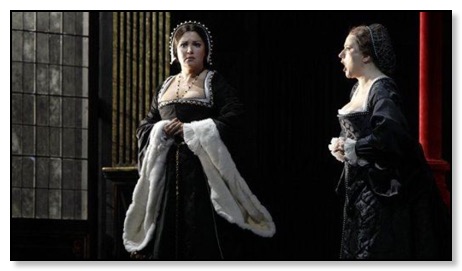

Churchill's Lost Election
26/01/15 19:31 Filed in: History
The 50th anniversary of Churchill's passing was this weekend. I have long admired Churchill for many reasons. A lot of it is his style of writing and his sense of history especially family history. I have a number of his books in series. I love the History of the English Speaking People. I lived with those books daily for awhile. It certainly made me an Anglophile. Here is an interesting article on why Winston Churchill lost his election so soon after World War II was over.
Duchess of Devonshire
A recent article covered the death and some history of the Duchess of Devonshire, Debo, as she was known. Debo was a Mitford. To read about an example of the upper British class and some of its oddities, you have to read about the Mitfords. Especially the Mitford sisters. The author of this piece evidently knew the family and has written about them. Enjoy reading about a different world from ours. Are they privileged or damaged?
Viking Exhibit in London
29/03/14 08:43 Filed in: History
The Vikings are part of the history of England. They fought and conquered much of England, Ireland, and Scotland in territory. They went on to intermingle in the populace and would bring a large part of their culture with them that became a part of how the English progressed. The city of York in England has been hugely influenced by early Viking development. There is a fascinating museum there describing the impact. Now, the British Museum is having a display currently about the Vikings and this exhibition has been very well attended. One centerpiece is the frame of a 121 ft. Viking longship. We saw similar longships at the Viking Museum in Oslo. Read about the exhibition here. A bit of flavor for what is there.
“More than 50,000 visitors have so far absorbed the tales of wily Nordic gods, admired treasure hoards from as far afield as what is now Uzbekistan and shrunk from a warrior skull used to scare off enemies on the battlefield.
Vikings have long had a special place in British lore, not least as the guys who got there first. They roamed the seas and established far-flung trade links centuries before the British did. They enslaved and conquered and built an empire, albeit briefly, that included large swaths of England and Scotland. One of their descendants, the Norwegian explorer Roald Amundsen, even went on to beat Robert Falcon Scott to the South Pole in 1911.”
“More than 50,000 visitors have so far absorbed the tales of wily Nordic gods, admired treasure hoards from as far afield as what is now Uzbekistan and shrunk from a warrior skull used to scare off enemies on the battlefield.
Vikings have long had a special place in British lore, not least as the guys who got there first. They roamed the seas and established far-flung trade links centuries before the British did. They enslaved and conquered and built an empire, albeit briefly, that included large swaths of England and Scotland. One of their descendants, the Norwegian explorer Roald Amundsen, even went on to beat Robert Falcon Scott to the South Pole in 1911.”
Richard III and DNA Testing
12/02/14 12:40 Filed in: History
I have written a few times about the finding of Richard III’s skeleton under a carpark in mid-England at Leicester. The last reference was just a few days ago when I mentioned the determination that Charlemagne’s bones were most likely truly his. The researchers at the University of Leicester have decided that they will try to have Richard III’s DNA sequenced. They believe it will help them determine his history and health. a description of the plan can be read here.
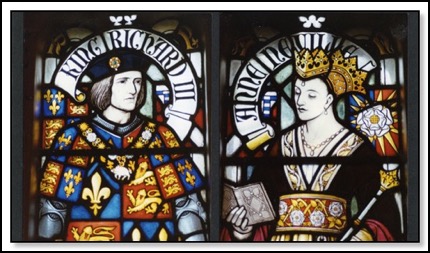

Origins to English
23/01/14 09:15 Filed in: Interests
There are many early languages that serve as the basis for many of our English words. The languages are Latin, Germanic, old English based, and also Viking. Viking because they conquered a large part of the British Isles and their culture intertwined with the Anglo-Saxons. One has to visit York, England and visit the Viking Museum there to get a better flavor of this. The whole city has areas that show the influence of Vikings from centuries ago. I came across this webpage that covers a number of English words that derive from the Vikings. It is a bit of fun to sort through their examples.
Alfred the Great Remains Found Now?
20/01/14 20:26 Filed in: History
Just as I have written in prior blogs, Richard III’s, King of England, remains were located in the past few years under a parking lot in England. Now they have found remains that they feel could be of King Alfred the Great of England. A description of Alfred follows..........
Alfred is the only English king to carry the moniker, “Great,” and is known for his passion for education, which was instrumental in the development of the English language. He ruled the kingdom of Wessex in southern England from 871 until his death in 899.
More information about where the bones were located and why they assume they are Alfred’s can be found here.
Alfred is the only English king to carry the moniker, “Great,” and is known for his passion for education, which was instrumental in the development of the English language. He ruled the kingdom of Wessex in southern England from 871 until his death in 899.
More information about where the bones were located and why they assume they are Alfred’s can be found here.
Agincourt
29/10/13 10:41 Filed in: History
If you enjoy history and Shakespeare, the story of Henry V of England and the battle of Agincourt is exciting. A battle on St. Crispin’s Day won by a small army against a much larger one of France. Or did they? There is some question that the disparity was not as much as suspected. Read about how historians are looking at the battle and reassessing it here.
Richard III and Travelers
08/10/13 09:34 Filed in: History
The finding of Richard III of England’s remains has been an intriguing bit of news in recent times. Maybe his winter of discontent was made possible by being infected by roundworm. According to news stories, they have found roundworm eggs in the soil where his intestines would have lain. The parasites were probably well fed since he was king. Was he less content by carrying them? Maybe Shakespeare had the inside track or knowledge. Hmmmmm?
In September, 2012, Richard's remains were excavated and sediment samples were taken from the sacral area of his pelvis, and control samples from his skull and the soil outside the grave cut. The results showed the presence of multiple roundworm eggs (Ascaris lumbricoides) in the sacral sample, where the intestines would have been during life.
In September, 2012, Richard's remains were excavated and sediment samples were taken from the sacral area of his pelvis, and control samples from his skull and the soil outside the grave cut. The results showed the presence of multiple roundworm eggs (Ascaris lumbricoides) in the sacral sample, where the intestines would have been during life.
An Interesting Life
24/09/13 09:52 Filed in: History
Louis Mountbatten was closely related to the Royal Family of Great Britain. His life’s story is very much tied to the 20th Century’s look at the Empire of Great Britain, especially related to India. His daughter, Lady Pamela Hicks, has written her biography that includes a look at her family and their part in this history. One can read about the book here.
Gibraltar
16/08/13 09:05 Filed in: History
There have been recent news articles about border crossing disagreements between Spain and the island of Gibraltar. Gibraltar has been under the control of Great Britain since it was given to them under the Treaty of Utrecht in 1704. Spain would like to have control of the Rock back. Gibraltar has given Great Britain the ability to grow their naval empire of earlier days due to access and control of the Mediterranean and the Atlantic Ocean. For more information about this area of history and geopolitics, you can read this article.
Rosetta Stone
03/08/13 21:30 Filed in: History
One of the ways Bob and I have determined is someone is somewhat knowledgable about history or even interested in learning is to ask what they think about the Rosetta Stone. No, I am not talking about the language learning product for sale on TV. We mean the real Rosetta Stone found by Napolean’s soldiers while on expedition in Egypt. The Rosetta Stone was a piece of stone issued around 196 BC on behalf of Ptolemy V that had translations from hieroglyphics to Demotic script to Ancient Greek. Without the stone, we would not have been able to translate hieroglyphics into a more modern language for understanding. It was a fabulous find in archeology and is located in the British Museum in London. One of the highlights of our time there was visiting the museum and seeing the Rosetta Stone. Here is Bob standing next to the Rosetta Stone.
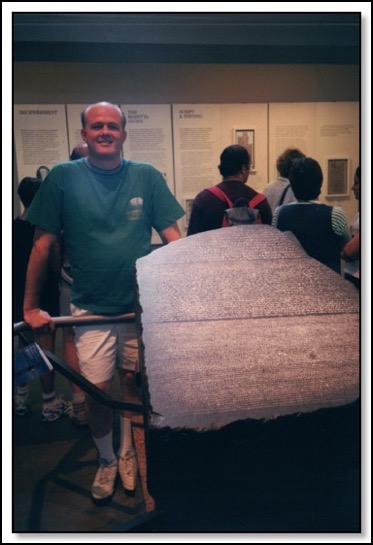

Richard III of England Redux
01/08/13 14:44 Filed in: History
There is further information that has come to light or at least another coffin come to light at the Richard III of England gravesite. As described in this article and below……….(later on the remains in the coffin were identified in this story).
A team of archaeologists said Monday it has unearthed an unusual coffin-within-a-coffin in the central England parking lot where it found the skeleton of King Richard III, and that they hope to identify the remains within.
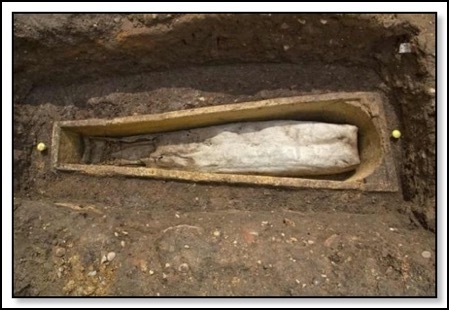
A team of archaeologists said Monday it has unearthed an unusual coffin-within-a-coffin in the central England parking lot where it found the skeleton of King Richard III, and that they hope to identify the remains within.

England and the Raj
The historical underpinnings of India as a part of the English empire has been controversial. Belief was that India, its resources, and its people were exploited by the British. There is an article and recent book that states British rule most likely gave India its basis as an economically growing country. Read the whole article here.
The period of colonial rule, spanning some 200 years, is routinely depicted as the systematic plundering of a nation. The popular view is that the Empire stripped India of its natural resources and gave little in return, leaving the place all but destitute when independence was finally granted in 1947.
Now, however, a new book written by an Anglo-Indian challenges this notion. It asserts that in fact Britain laid the foundations for modern-day India and the prosperity that it enjoys today.
The period of colonial rule, spanning some 200 years, is routinely depicted as the systematic plundering of a nation. The popular view is that the Empire stripped India of its natural resources and gave little in return, leaving the place all but destitute when independence was finally granted in 1947.
Now, however, a new book written by an Anglo-Indian challenges this notion. It asserts that in fact Britain laid the foundations for modern-day India and the prosperity that it enjoys today.
Lock Pickers in Olden Days
13/03/13 10:51 Filed in: History
“Ripper Street” is a crime drama found on BBC America Saturday nights. It has the feel of “Copper” which is set in New York City among the Irish in 5 Corners as a drama. There was an interesting story that brought these two dramas to mind and that is one on lock pickers. One American traveled to England to open a supposed impossible to open safe. He had gained a reputation in the United States of being able to open supposed difficult locks. It is a fascinating history of this trade, crime, and people in that day and age of England. Check it out here in this article in Slate online.
They were drawn by a curious invitation: “To witness an attempt to open a lock throwing three bolts, and having six tumblers, affixed to the iron door of a strong room.” The men gathered around the door to a vault, once the repository of records for the South-Eastern Railway. At their center was an unassuming figure, an American named Alfred C. Hobbs, clad in waistcoat and collar. At 11:35 a.m., Hobbs produced a few small tools from his pocket—“a description of which, for obvious reasons, we fear to give” a correspondent for the Times wrote—and turned his attention to the vault’s lock. His heavy brows knitted, Hobbs’ hands flitted about the lock with a faint metallic scratching. Twenty-five minutes later, it opened with a sharp click. Amid the excited murmur, the witnesses asked Hobbs to repeat the task. Having relocked the vault, he once again set upon it with deft economy. The vault opened “in the short space of seven minutes,” as the witnesses would testify, “without the slightest injury to the lock or the door.”
They were drawn by a curious invitation: “To witness an attempt to open a lock throwing three bolts, and having six tumblers, affixed to the iron door of a strong room.” The men gathered around the door to a vault, once the repository of records for the South-Eastern Railway. At their center was an unassuming figure, an American named Alfred C. Hobbs, clad in waistcoat and collar. At 11:35 a.m., Hobbs produced a few small tools from his pocket—“a description of which, for obvious reasons, we fear to give” a correspondent for the Times wrote—and turned his attention to the vault’s lock. His heavy brows knitted, Hobbs’ hands flitted about the lock with a faint metallic scratching. Twenty-five minutes later, it opened with a sharp click. Amid the excited murmur, the witnesses asked Hobbs to repeat the task. Having relocked the vault, he once again set upon it with deft economy. The vault opened “in the short space of seven minutes,” as the witnesses would testify, “without the slightest injury to the lock or the door.”
Stonehenge
11/03/13 11:37 Filed in: History
Having been to Stonehenge, or at least looking in from the perimeter, there are reports from researchers that Stonehenge was possibly a graveyard to start. To learn more, please read this article about this new theory. An excerpt…….
British researchers have proposed a new theory for the origins of Stonehenge: It may have started as a giant burial ground for elite families around 3,000 B.C.
New studies of cremated human remains excavated from the site suggest that about 500 years before the Stonehenge we know today was built, a larger stone circle was erected at the same site as a community graveyard, researchers said Saturday.
"These were men, women, children, so presumably family groups," University College London professor Mike Parker Pearson, who led the team, said. "We'd thought that maybe it was a place where a dynasty of kings was buried, but this seemed to be much more of a community, a different kind of power structure."
Parker Pearson said archeologists studied the cremated bones of 63 individuals, and believed that they were buried around 3,000 B.C. The location of many of the cremated bodies was originally marked by bluestones, he said. That earlier circular enclosure, which measured around 300 feet (91 meters) across, could have been the burial ground for about 200 more people, Parker Pearson said.

British researchers have proposed a new theory for the origins of Stonehenge: It may have started as a giant burial ground for elite families around 3,000 B.C.
New studies of cremated human remains excavated from the site suggest that about 500 years before the Stonehenge we know today was built, a larger stone circle was erected at the same site as a community graveyard, researchers said Saturday.
"These were men, women, children, so presumably family groups," University College London professor Mike Parker Pearson, who led the team, said. "We'd thought that maybe it was a place where a dynasty of kings was buried, but this seemed to be much more of a community, a different kind of power structure."
Parker Pearson said archeologists studied the cremated bones of 63 individuals, and believed that they were buried around 3,000 B.C. The location of many of the cremated bodies was originally marked by bluestones, he said. That earlier circular enclosure, which measured around 300 feet (91 meters) across, could have been the burial ground for about 200 more people, Parker Pearson said.

The Plantagenets
05/02/13 16:56 Filed in: Interests
With the discovery of Richard the III’s bones, a recent article online discussed the over 300 period the Plantagenet’s ruled England. The period began with Henry II, son of Queen Maude and Geoffrey of Anjou, and ended with the death of Richard. Henry the VIII did all he could to eliminate Plantagenet descendants who could have been a threat to the Tudor dynasty. He did a good job though some did carry through. I love the Plantagenet’s and their strong, often ruthless history. They were what drew me to love English history. It is fun to see it carried into today’s current news.
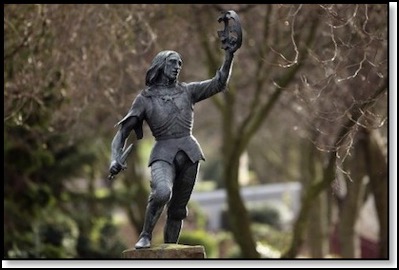

Shakespeare Uncovered
06/02/13 16:48 Filed in: Interests
Romany History
15/01/13 15:23 Filed in: Interests
In the 1990s, Bob and I made a trip to Devon by way of Salisbury and Winchester. We traveled down a busy main 2 lane road that headed toward Exeter. We were faced at one point with a fascinating spectacle not seen here in the United States. In the opposite lane approaching us was a Romany wagon being pulled by 2 horses and lead by a Romany man, young, with his family in the wagon. Behind the wagon, there was a long line of cars waiting for an opportunity to pass. The present rushing to meet the past and go beyond. A clash of cultures. I will never forget that scene because of the contrast and seeing history coming up to meet us.
For an interesting discussion of how the Romany migrated from northwest India to Europe and how they have been able to track that migration through genetics, please read here.
For an interesting discussion of how the Romany migrated from northwest India to Europe and how they have been able to track that migration through genetics, please read here.
Hastings
26/10/12 16:49 Filed in: Interests
It is not exciting to have one of your history beliefs possibly shattered. Though it is interesting at the same time to have new knowledge and recognition come to the forefront.
I just read a recent article that there is a belief that the Battle of Hastings (1066 A.D.) was not fought on Battle Hill near Hastings, but was fought about 1 mile northwest on another hill, Caldbec Hill. They believe that there could be 10,000 bodies from the battle located in that area. Of course, they plan for an archeological exploration of that area. It is sad to think that Bob and I have visited Battle Abbey and walked the Battle of Hastings grounds. We looked over the terrain where so much of English history changed and probably our history here in the States. We were possibly not looking at the true area and missed the real historical spot. Historical concepts will be turned a bit upside down if this is found to be a correct theory and the battlefield is located elsewhere. Just think though of what they may find if they do locate all the remains of soldiers from so long ago.
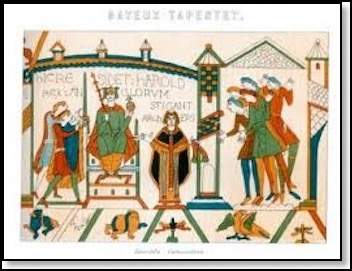
Bayeux Tapestry
I just read a recent article that there is a belief that the Battle of Hastings (1066 A.D.) was not fought on Battle Hill near Hastings, but was fought about 1 mile northwest on another hill, Caldbec Hill. They believe that there could be 10,000 bodies from the battle located in that area. Of course, they plan for an archeological exploration of that area. It is sad to think that Bob and I have visited Battle Abbey and walked the Battle of Hastings grounds. We looked over the terrain where so much of English history changed and probably our history here in the States. We were possibly not looking at the true area and missed the real historical spot. Historical concepts will be turned a bit upside down if this is found to be a correct theory and the battlefield is located elsewhere. Just think though of what they may find if they do locate all the remains of soldiers from so long ago.

Bayeux Tapestry
